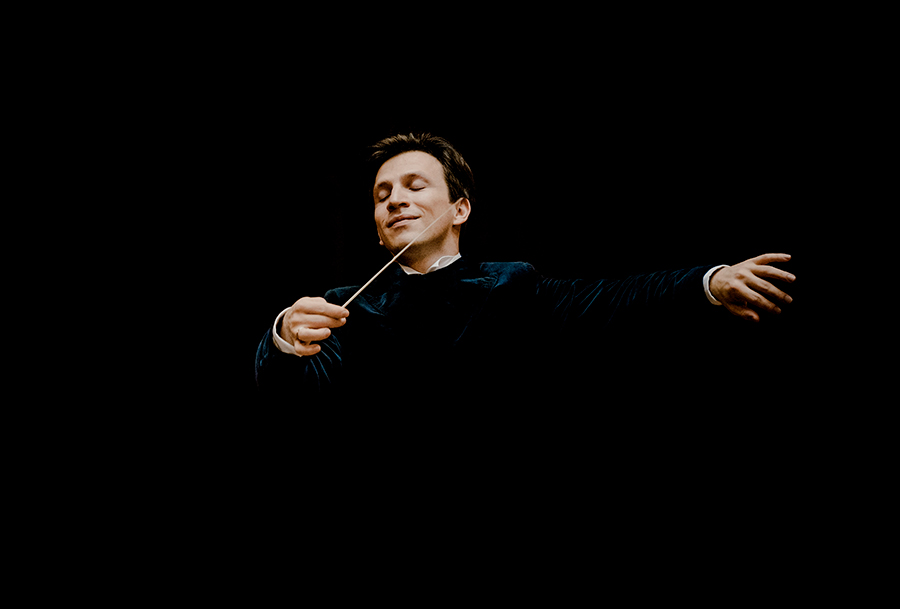
Photo: Marco Borggreve
Looking at Cornelius Meister’s calendar inspires a mix of wonder and exhaustion.
The German conductor, who is Music Director of the Staatsoper und Staatsorchester Stuttgart, is currently in New York City, leading performances of Mozart’s Le nozze di Figaro at the Metropolitan Opera until February 22nd. From there, he jets off to Tokyo to lead the Yomiuri Nippon Symphony Orchestra (of which he is Principal Guest Conductor) before playing with various orchestras in France, Germany, and Austria. A return to Stuttgart comes the end of April; Meister will conduct a series of concerts and also conduct a revival of Tristan und Isolde, where he’ll be leading soprano Catherine Naglestad in her role debut as the doomed Irish princess. May brings a production of Strauss’s Arabella in Vienna, and the summer features a busy mix of concerts and opera back in Stuttgart. All this activity doesn’t even touch Meister’s extensive discography, many of them done when he was Chief Conductor and Artistic Director with the Radio-Symphonieorchester Wien (ORF) between 2010 and 2018.
Meister, whose father was a professor at Musikhochschule Hannover and whose mother is a piano teacher, started out in 2003 as Second Kappellmeister with Staatsoper Hannover (his hometown), before becoming Music Director of the Theatre and Philharmonic Orchestra of Heidelberg, where he stayed for seven years, until 2012. His recordings (of Brahms, Haydn, Dvořák, Mozart, Wagner, Bartók, Zemlinsky, and particularly Bruckner) and live work (a comprehensive A to Z listing on his website includes, among the very many, Beethoven, Lehár, Gershwin, Mahler, Boulez, Nono, Stravinsky, Webern, and Zender) reflect an insatiable musical appetite, one that seems to grow with each new orchestra and experience, whether orchestral or operatic. Meister’s tenure at Oper Stuttgart began in 2018, having already conducted at numerous prestigious houses, including Oper Zürich, Teatro Alla Scala Milan, Semperoper Dresden, and Wiener Staatsoper, and festivals including those at Glyndebourne, Salzburg, and in Bucharest, at the biennial Enescu Festival.
All this activity isn’t exactly unusual for a successful artist within the classical sphere, but the breadth and range of Meister’s musical curiosity is as enlightening as it is exhilarating. I became much better acquainted with the symphonies of Bohuslav Martinů thanks to a truly brilliant 2017 recording (Capriccio Records) of the Czech composer’s complete symphonies. Recorded with the ORF between 2011 and 2017, the mammoth album (spread across three CDs) is a gorgeous lesson for both newbies and Martinů connoisseurs alike, revealing Meister’s focus on maintaining keen balances between individual voices within the rich orchestral tapestries, while emphasizing their unique tonal and structural paths and underpinnings. At its release, music writer Michael Cookson noted that “Meister palpably generates considerable tension in his readings and the playing, full of rhythmic energy, is never less than steadfast, whilst shaping phrases that give consideration to every nuance.”
His 2014 album of the music of Wagner (Capriccio Records), again with the ORF and featuring soprano Anne Schwanewilms, performing the beloved Wesendonck Lieder and and Elisabeth’s Aria from Tannhäuser, is a sumptuous mix of big and small; Wagner’s sweepingly broad overture to Tannhäuser is here given loving pockets of quietude, with rippling strings that glint softly, shimmering against woodwinds and brass, Meister’s watchful tempi and textural swells throughout the album underline the music’s connection to a broader scope of musical history, both backward-looking (Beethoven) and anticipatory (again, Martinů, which would make sense given the album’s timing). Meister and I recently spoke amidst performances of Nozze at The Met; I asked the busy father of three how he kept up such a hectic pace, before moving into musical, and, as you’ll read, dramatic (and even balletic) matters.
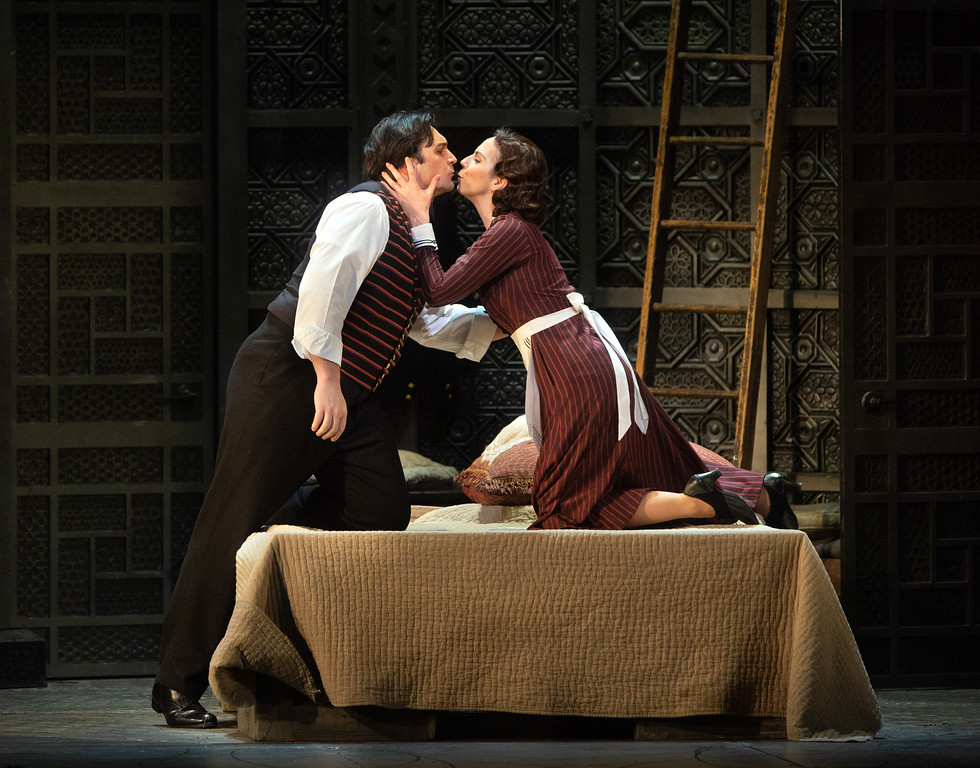
Adam Plachetka as Figaro and Hanna-Elisabeth Müller as Susanna in Mozart’s “Le Nozze di Nozze.” Photo: Marty Sohl/The Metropolitan Opera
You have a lot of diversified engagements – how do you keep your energy and inspiration?
I have a family, and I must say, I love music and opera of course but it is not everything in my life. And without my family, I think I couldn’t do everything.
Many artists say that family provides the balance amidst the chaos.
Yes. I’m very happy to be born not ten or twenty years earlier, because nowadays it is so much easier to call each other from another continent or city, and to take fast trains and such. We didn’t have these things even fifty years ago; now it’s much easier to keep in touch.
The houses that you perform in (Stuttgart, Zürich, Vienna, New York) are all so different; how do you create intimacy within each space?
When I’m conducting, let’s say an opera by Mozart, it matters a lot which room I’m performing it in regarding the acoustics. In Germany there are a lot of ensembles, so between thirty and forty singers who work regularly; that means sometimes we prepare role debuts together, one year ahead or even more. Last season in Stuttgart, we did Ariadne Auf Naxos and we had a wonderful mezzo soprano who is now in our ensemble, and she prepared it more than one year in advance – this is only possible in houses with an ensemble.
On the other hand, here at The Met I have the privilege to work with many singers who have done their roles in various productions at several great opera houses, so this makes it easier in another aspect, I would say – their acoustic awareness could start on the highest level, and the beauty for me, as a conductor, is then to bring all these different experiences together to create a production ensemble.
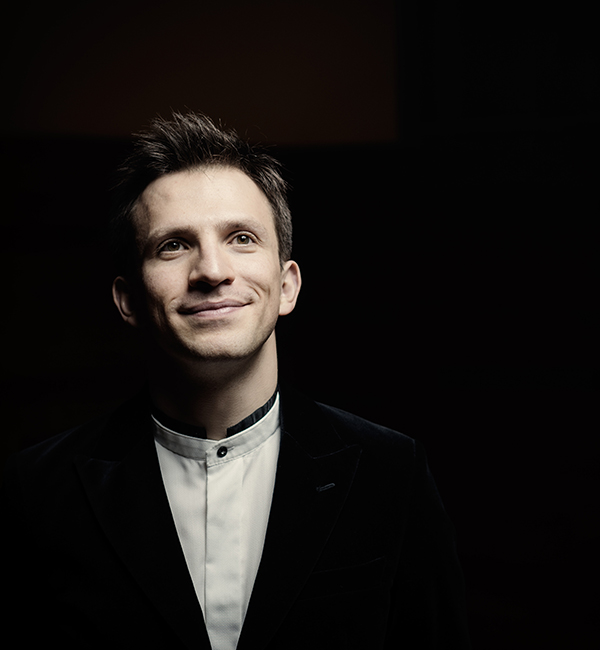
Photo: Marco Borggreve
You said in a 2019 interview that conducting is about making music together – how does that relate to the inherent power dynamics of being a conductor? How do you balance the power aspect with the collaborative aspect?
On the one hand, of course it is true that a conductor can decide a lot, but on the other hand, I’m the only person in the room who doesn’t play any tune or make the music by himself, so I can’t do anything without having everybody on the same side. I would say my job is to encourage everybody to be brilliant, and confident, and bring together all the different possibilities and traditions and experiences everybody has. And in houses like the Metropolitan Opera, where everybody in the orchestra has played these operas a lot, with many different conductors, it’s not a question of, “How we do it?”, it’s more a question of how we all can do it in the same style, and how we can bring it all together. This is a task I like very much. I also like to be flexible when I conduct the same opera in Vienna and New York – the result is, of course, very different; it’s still my Mozart, for example, but there is not just one Mozart which is my Mozart.
Would you say that flexibility is the key to authority in your position?
In a way, yes, but I would also say that it is really necessary to have some strong ideas of what I want – having something I really like and really want with music, and being flexible to bring everybody to that result.
That must be especially true when you move between so many different orchestras as you are about to do, post-Nozze. Where does flexibility fit within your experiences between different ensembles, especially ones you have such a short amount of time with?
I always try to use the tradition an orchestra has – so the Viennese tradition, or maybe the Dresden Staatskapelle tradition, for example – those traditions are really old, and I adore them, and I always make a point to ask members of the orchestra how are they used to playing this or that. When I’m in Vienna I spend hours and hours in the library to research information which is hand-written into the orchestra parts, hand-written from the time when Richard Strauss and Gustav Mahler conducted there. I wouldn’t think that us younger conductors should always start at point zero; we should use that tradition, we can learn from it. In Stuttgart we are using the original harmonium used at the Ariadne world premiere – the first version of the opera was performed in Stuttgart in 1912, just two months after the opening of the opera house, with this very harmonium.
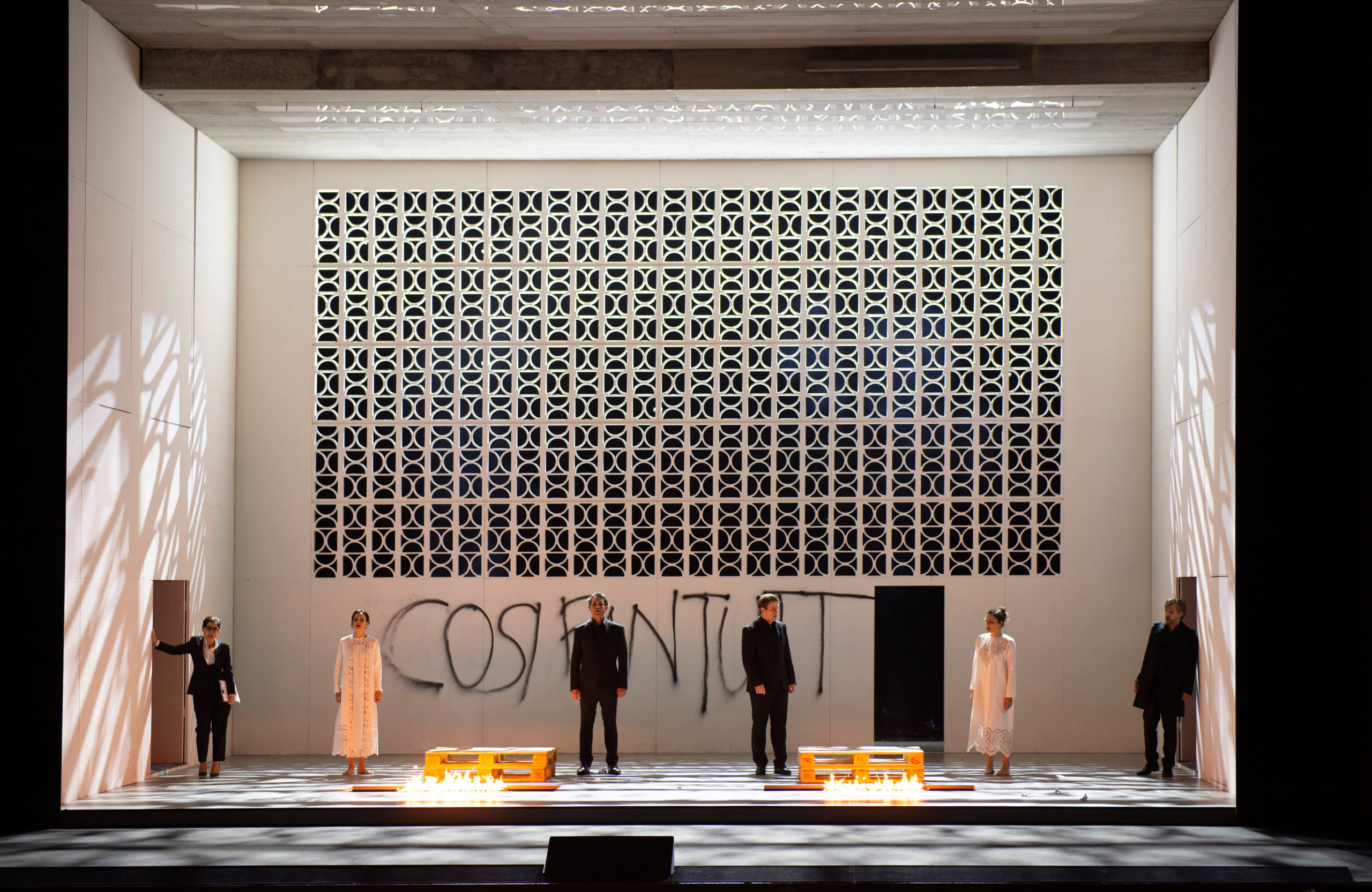
Oper Zürich’s 2018 production of Così fan tutte. Photo © Monika Rittershaus
Where does that sense of tradition fit when you are working on a new production? You had an special situation in Zürich in 2018 with a new production of Così fan tutte, and you also led a new work, The Snow Queen, in Munich in 2019.
in Zürich the situation was that we didn’t have the director face-to-face – we were in close contact. So every morning we got a new video message from Kirill Serebrennikov; there was contact and he had brilliant assistants in Zürich, but for me as a conductor, the face-to face exchange is really important when preparing a new opera production. When I’m conducting opera, I’m not only a musician; I try to be a theatre person also, and I need a sense of every aspect of the drama. The first and most important question, always, is not, “how can we play the music?” but “how can we create that emotion, that dramatic situation?’ In order to create that situation you have several possibilities; there are scenic possibilities and musical possibilities, but these are, for me, totally secondary. The first question has to relate to the drama. And if I don’t have a partner to whom I can say something and to which he can react – not only by email or whatever – then it isn’t so easy! In the end (for Così fan tutte) of course I was very happy we did it, and it was very important, I think, to do that in Zürich.
In Munich the situation was completely different because there the piece (directed by Andreas Kriegenburg) had already been performed in Copenhagen some months before, so it was already set, on a certain level. Rachel Wilson, who is from Texas and is in the ensemble in Stuttgart now, sang the main mezzo role (Kay) in The Snow Queen, and she was really well-prepared coming in, so it was quite easy.
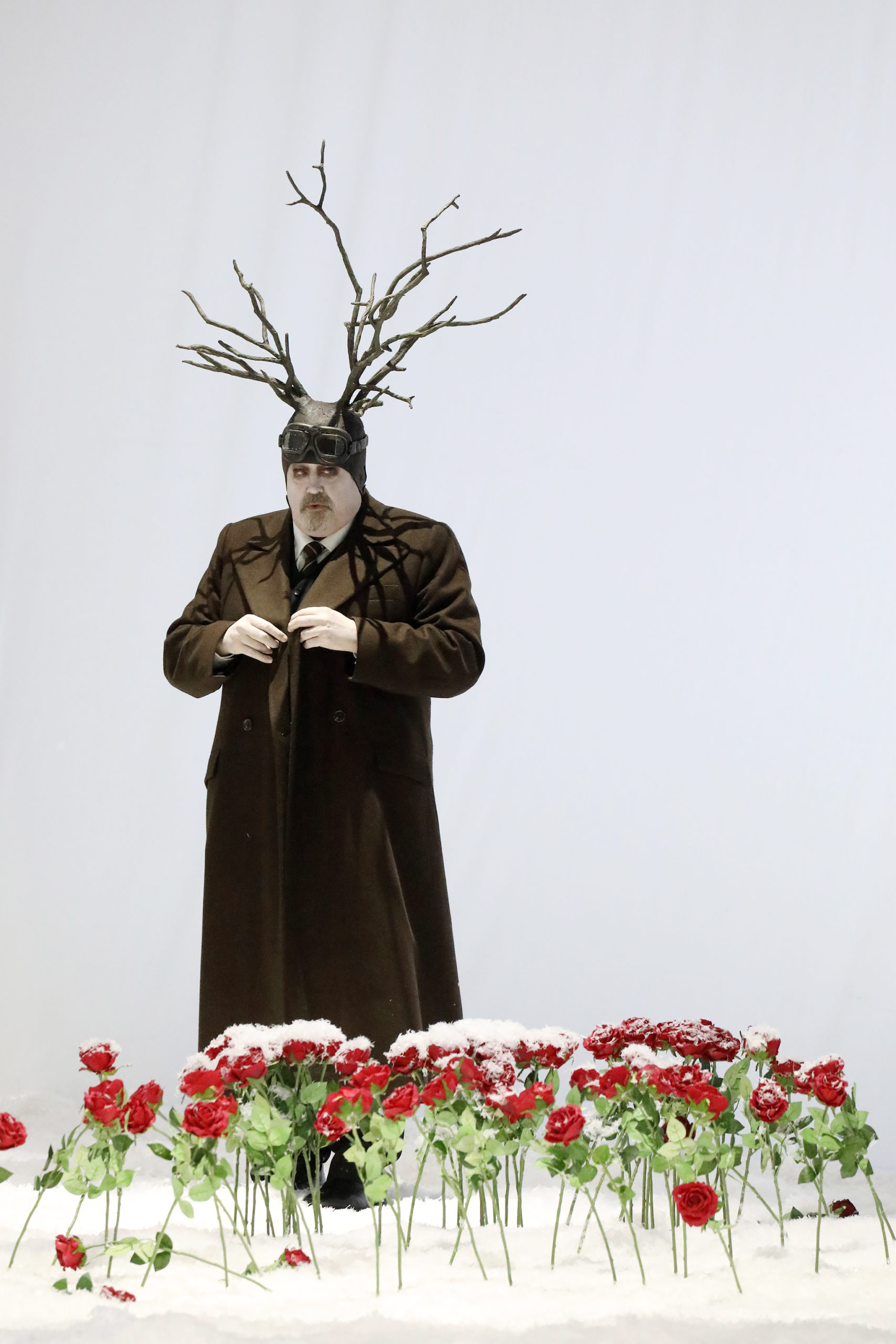
The Snow Queen at Bayerische Staatsoper in 2019. Photo © Wilfried Hösl
When you perform symphonic works by the likes of Martinů and Bruckner, and then go back to the opera house and do Wagner and Mozart, what things do you take with you between the two worlds?
I always appreciate it when orchestras who play symphonic music are also experienced in accompanying singers. In my opinion, a violin group who is used to listening to a singer in the opera is also very flexible and fast in listening to a solo oboe, for example, in a symphony. On the other hand, I appreciate it a lot when orchestras which are playing normally a lot of opera are also used to, in some situations, sitting on the stage and creating something unique for one or two or three performances. From one world I try to take the best and then bring it to the other world, and of course, some composers, like Mahler and Schumann and Brahms, wrote very opera-type things, and it’s good to have those works be performed also, because for me there is not such a big difference between theatrical music and other music.
When we have the Third Symphony of Bruckner, for example, with its quotations of Wagner in its first edition, this is a good example for that close relationship between those worlds, but I know there are many conductors who are conducting either operas or symphonic music. Others do mostly oratorios and choir music. I respect that, because I think (the music) needs different techniques, conducting techniques, and people to conduct different styles, but I always try to learn as much as I can from all these works. I have also conducted oratorios and ballets during my Kapellmeister time years ago, and sometimes I would conduct silent movies too.
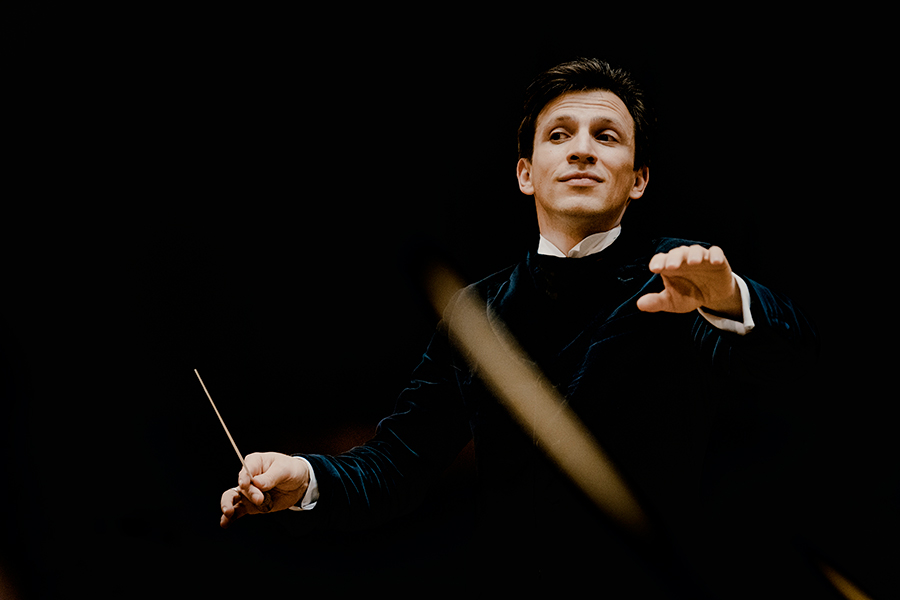
Photo: Marco Borggreve
What did you learn conducting ballet?
A ballet dancer needs certain tempos as a singer would need. I, as a musician, hopefully can sense if a singer needs a certain tempo. When is started to conduct ballets, it was much more difficult for me to feel that sense of which was the right tempo for him or her, and sometimes we had different ballet dancers on stage who needed different tempi. After some experiences it was easier for me to see and to feel how movement onstage is related to music tempi, and this helps now, a lot, when I’m conducting operas – not only to listen, but also to watch which is the right tempo for an action or movement onstage.
This relates to what I said earlier, that for me, music is a part of a larger theatrical performance. I had an experience eleven years ago when I conducted The Abduction From The Seraglio at the San Francisco Opera, my first opera experience in the United States (in 2009). I had conducted it before in Germany. I took approximately the same tempo which I had taken before, but with this production in San Francisco, it didn’t work. I had to take a different musical tempo and then it worked within a scenic sense, not only for the action but for the atmosphere onstage. I changed my musical approach, quite happily.
You took lessons with your father – how much do you think this quality of openness relate to that time?
He and I spent so many hours playing piano together, four hands style. We would go through and play all the Beethoven works, and all the Bruckner symphonies. He was never a conductor, but he was really interested in everything, not only piano music, but also he had a great knowledge about history and culture in general. So through this approach I learned to always be open to the world, and to be interested in different sounds, and in people from different nations and people with different ideas of the world. This was my education, and I am really glad for that.
That curiosity is apparent from the wide repertoire list at your website, which includes the work of Claude Vivier.
For me there has never been a difference between old and contemporary music, because this is the music I’m interested in, and there’s music I may be, at the moment, not so much interested in, but it doesn’t matter which year it’s from. When I was with the ORF it was totally normal to play all different types of music. When we started to rehearse a piece which none of us had performed before, we didn’t ask if this is a good piece or not, because we always started, and after some days, then maybe we started to think something, not as a absolute judgement, but maybe we allowed ourselves to say, “Okay, I like this or that” but never on the first day. We would never be so self-confident to judge music on the first look of it.
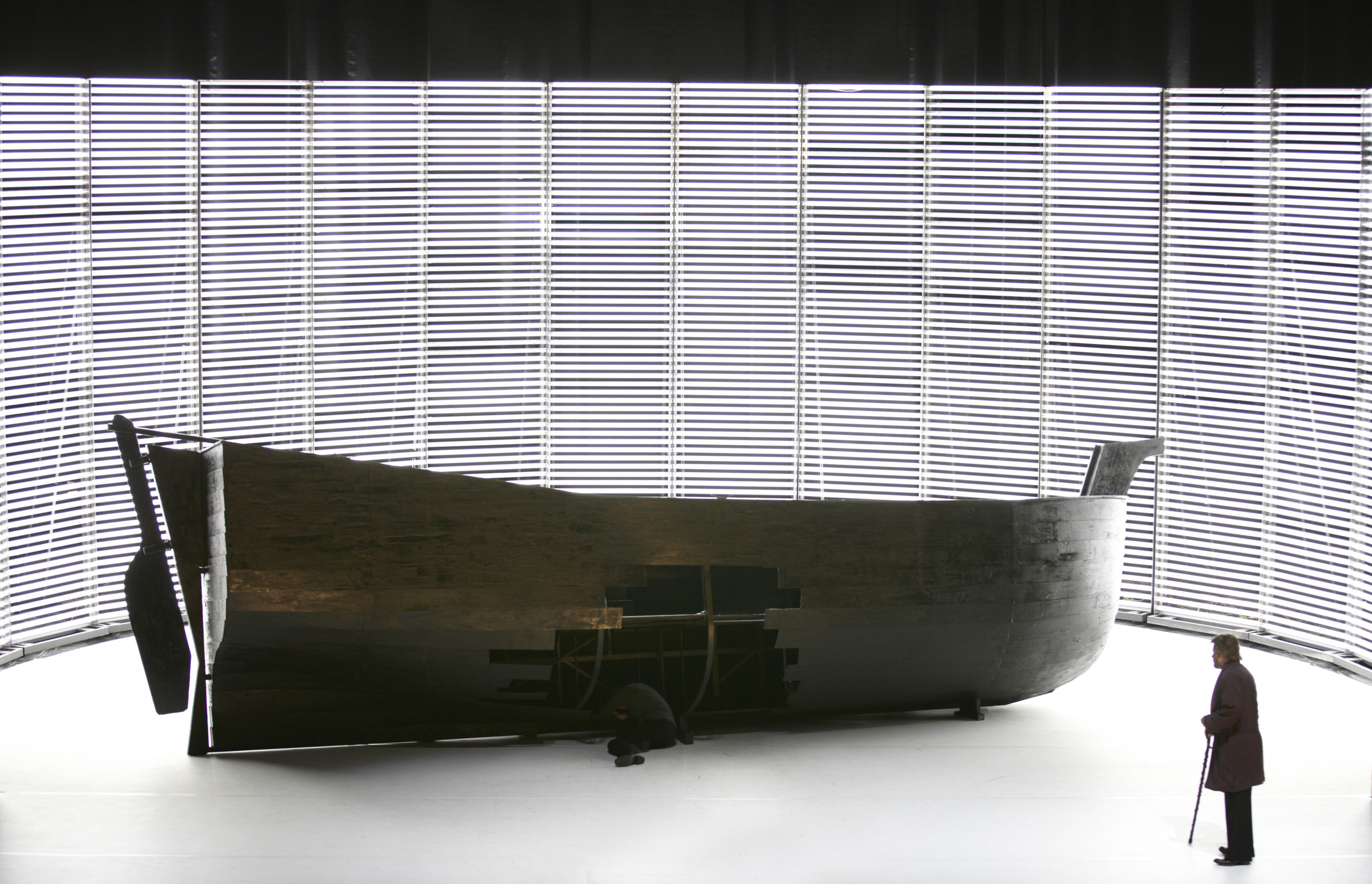
Tristan und Isolde, Oper Stuttgart. The production, from the team of Jossi Wieler and Sergio Morabito, was first presented in 2014. Photo © A.T. Schaefer
Do you think that approach could apply to audiences hearing things for the first time?
I’m not in the position, or I would not like to be in the position, to give advice to audiences, because I respect there are many, many different reasons why a person likes to go to a concert or opera. I respect that the reason could be just to have a wonderful evening, enjoy a glass of champagne at intermission and to relax, not to think too much. This is a good reason. There’s another good reason for people who maybe prepare their opera visits a week before, and they read many books about it, and then they really want to have a strong production, strong Regie, so that they can think about it for the next week, and maybe they wouldn’t understand everything and they like not to understand everything but want to come back three times to get it. Once again, I wouldn’t think I should give advice on how an audience should deal with a performance visit, but I respect that there are different reasons, good reasons.
So just come with an open mind….?
Being open-minded, always, is not a bad idea! What I really ask everybody is not to open the mouth before having thought something out – this is the general advice, for music and for life.

Leave a Reply